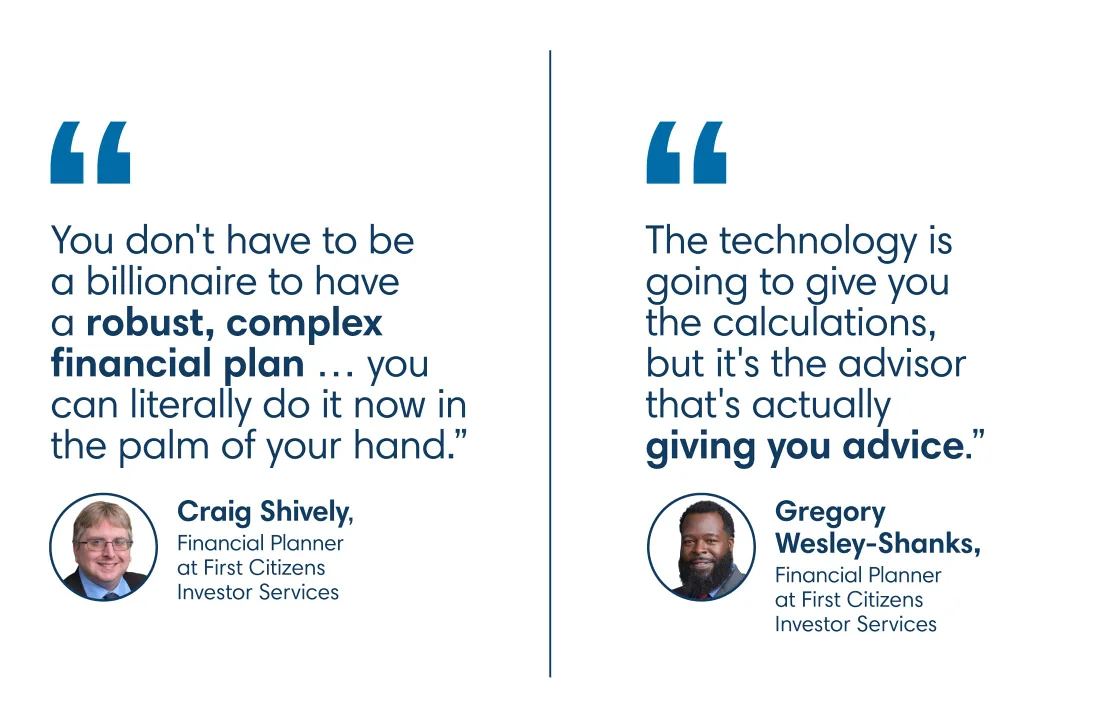Digital banking for business
Seamlessly access all of your accounts from one place with First Citizens Digital Banking for business.
We've entered an age when cutting-edge financial planning tools fueled by AI algorithms and analysis help inform personalized advice. But as wealth management becomes more data-driven, it needs a human touch more than ever.

New financial tools have revolutionized wealth management, helping to streamline processes and automate tasks. The payoff is that they're freeing up financial advisors to craft unique financial strategies that allow their clients to protect and pursue what matters most to them.
Wealth management technology isn't just an option—it may be essential to your pursuit of prosperity. Today, software and other resources are more accessible, giving you enhanced control of your financial future. In fact, these tools are at the forefront of a larger sea change throughout the financial planning industry.
The once-elite world of wealth management has broadened, and you now have tools at your disposal that your grandparents couldn't imagine.
"Thanks to technology, investing tools are now available to a much broader audience that otherwise would've never had access to the markets," says Craig Shively, a financial planner at First Citizens Investor Services. "You don't have to be a billionaire to have a robust, complex financial plan. You don't need an army of accountants working for you. You can literally do it now in the palm of your hand. And I think that's huge."
Financial planning tools typically provide a personalized dashboard with 24-hour access to your complete financial picture. This often includes real-time account information, investment performance data, asset allocation and goal-tracking updates. You or your advisor may also be able to run various what-if scenarios. By inputting different variables—such as market outlook data and interest rate changes—you can see how those potential scenarios would affect your financial plans.
The combination of established, proven technology and the subjective guidance an advisor can provide is integral to financial planning. It's not just about having advanced tools at your disposal—it's about how these tools translate into a more connected and informed financial journey.
"My clients have confidence that we know how to leverage the benefits of technology," says Gregory Wesley-Shanks, also a financial planner at First Citizens Investor Services. "We're able to solve a lot more variables on the fly than we would've been able to without it."

In years past, you'd make an appointment to visit your financial advisor to discuss your goals. They'd take a bunch of notes and disappear to manually crunch numbers and run scenarios to come up with a plan for your retirement or other financially driven goals.
All that has changed, thanks to financial advisor tools. Now, wealth advisors can draw conclusions in a matter of minutes to provide their clients with high-quality, comprehensive and long-lasting financial plans.
"As financial planners, we really couldn't do our job without technology," Shively says.
By leveraging these new tools, wealth planners can provide clients with complex insights, including debt ratios, savings rates, contribution rates and tax law consequences. Financial advisor tools can perform complex computations instantly, allowing advisors to develop a range of scenarios—which otherwise would be impossible or overly time-consuming to do with manual calculations.
All this improved efficiency doesn't just save time. It allows your financial advisor to focus more attention on your goals—and your fears. Chances are you have many concerns about your financial future. What if you run out of money in retirement? What if there's a big shift in the market? What happens to your retirement plans if a medical emergency comes up?
By using advanced algorithms to aggregate data from all of your accounts, advisors can see a holistic view of your financial picture. They can plug in details like bank account deposits and investment ratios—as well as personalized financial data such as your retirement goals, children's education needs, big life events and insurance protections.
This aggregated view enables wealth planners to craft customized strategies that align with your unique situation and wishes.
Taking advantage of the benefits of this technology also means acknowledging its risks. Like all modern technology, financial tools come with the daunting possibility of data breaches and identity theft. However, by adopting rigorous cybersecurity best practices, such as unique identifiers and encryption, a diligent and reliable advisor or firm can be vigilant in safeguarding client information.
Despite its challenges, wealth management technology provides increased synergy between you and your advisor through shared real-time data and more personalized interaction.
Looking forward, with continuing advancements in wealth management technology, the bond between you and your advisor may only grow stronger. "Your advisor is there to analyze what all the data means," Wesley-Shanks says. "The technology is going to give you the calculations, but it's the advisor that's actually giving you advice."
Email Us
Please select the option that best matches your needs.
Customers with account-related questions who aren't enrolled in Digital Banking or who would prefer to talk with someone can call us directly.